Interview with Ms Jenny Cai, Partner Attorney | RICC & Co , Law Firm
RICC & CO. is a boutique law firm established in Shanghai, including 76 formal employees, 65 of whom are professional lawyers. The firm’s legal services mainly focus on shipping & admiralty, insurance, ODI & FDI, customs & trade compliance, corporation, finance, intellectual property, labor & personnel, criminal affairs, compliance/regulatory, taxation & wealth planning, marriage & domestic, real estate & construction and provide clients with comprehensive legal advices and solutions.
Script of Interview
Interviewee Ms. Jenny Cai (JCai)
Position Partner Attorney
Company name RICC & Co.
Company website URL http://www.ricc.com.cn/index.php/en/
Interviewer John D. Evans, CFA (JE)
Interview conducted on 12th August 2020
About Jenny Cai
JE: Okay. Great. So, I’ve got the talking points here, the one I just sent you with the red number to the slides. So let us start off with you giving the viewers a little bit about your background, both in terms of yourself personally where you grew up, etc. Your studies, just a little bit of background so people get to know you.

JCai: Okay, well, I live in Shanghai now. And when I was a little younger, I lived in Shandong province in China. And when I go to study I went to East China University, for political science and law, I got my bachelor’s degree in English and foreign law. Then I got my master’s degree in financial MBA program from Shanghai Jiaotong University. Besides, I participated in the international MBA exchange program in Queens University at Kingston in Canada. Now I am a lawyer.
JE: Okay. Now just for people outside of China, Shandong is the province just north of Jiangsu just north of Shanghai. So not too far away from the metropolis of Shanghai.
JCai: Yeah.
JE: Okay. And Queen’s University I know that well as I grew up in Toronto, did you spend what one term over there one year over there, or what was that time?
JCai: To be specific, two semesters, but two semesters, equal to like nine months. So, it’s more than half a year but it is not a whole year. So, it’s two semesters. It is like a fall semester and a winter semester.
JE: I remember with my degrees in Canada, we only ever had two semesters, the fall semester and the spring semester that was normal for the Canadian universities. They get it like much more lighter over there than the longer terms in China. Okay. So, you’re now located in Shanghai, which I believe is the head office of RICC, the law firm, which you are a partner at. So, how is your business? I mean, are you mostly in Shanghai? Do you travel a lot over China? Does your business take you outside of China?
 JCai: Yeah, maybe you can see the slides. Yeah, I have my travel for business. I have gone to seven, seven countries and 39 cities. For my business. For example, I have to do the due diligence for investment. So, I have traveled more than 30 cities in China.
JCai: Yeah, maybe you can see the slides. Yeah, I have my travel for business. I have gone to seven, seven countries and 39 cities. For my business. For example, I have to do the due diligence for investment. So, I have traveled more than 30 cities in China.
JE: Yeah. Okay, now that’s interesting seven countries of the countries outside of China. Is there one that you go to more than the others? Is there more business in a particular country?
JCai: Yeah, Japan and the US.
JE: Okay. Okay. Those are the two big areas, which are two very big economies. So, I guess that makes a lot of sense. Okay. Now you’re a partner at RICC. I’m not sure of the, the sort of the legal structure, laws related to lawyers and partners. Do you have any other business or outside interests? Are you a member of the board of any company or society Is that sort of thing allowed?
JCai: As a lawyer in China, we are not allowed to have any other part time job or businesses, is not legal actually.
About RICC
JE: Okay. So that, presumably is to prevent any sort of conflicts of interest in coming up in businesses. So, your partner at a law firm and you can’t take on outside board positions as lawyers do in some other countries. Okay. So that’s, that’s a difference between China, a more strict requirement to be completely dedicated to your company. Okay. So, that’s a little bit about you. Let’s talk a little bit about your company, RICC & Co. Give us a sort of general description of what the company is now. Does it have more than one office? How many staffs, partners, just general overview.
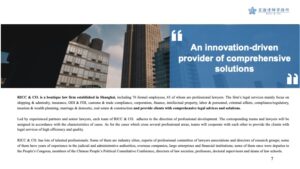
JCai: Okay, RICC & Co. is a boutique law firm in Shanghai, and we have 76 formal employees and 65 of whom are lawyers. In this, as a law firm, we provide clients with a comprehensive legal and solutions.
JE: Okay, so 76 employees 65 in the legal business, would that be considered a big a medium size or a small firm in Shanghai?
JCai: It’s kind of like a top 3% in China. Yeah. As to the scale of the law firm. And we are considered a big law firm.
JE: Okay, okay, so 76 employees in a law firm in China is considered large law firm. Okay.
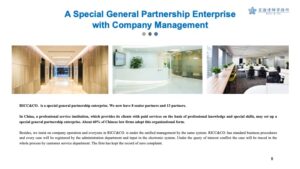 JE: What about the sort of license to do business? Is RICC, only licensed to do business in Shanghai or only in China or internationally? How does the jurisdiction of your business work?
JE: What about the sort of license to do business? Is RICC, only licensed to do business in Shanghai or only in China or internationally? How does the jurisdiction of your business work?
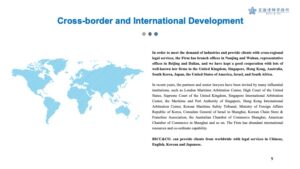
JCai: Yeah. As a lawyer in China, we are licensed to do business only in mainland China. But as a law firm, we also have branch offices in many other cities besides Shanghai, for example, Nanjing, Wuhan, Beijing, Dalian and Guangzhou and then as to cross border and international development. We have partnership is like we have, cooperating law firm in other countries. Like, like in UK, US and eastern Asia and Southeastern Asia, like Singapore, Hong Kong, and Japan, South Korea, Cambodia, Laos, Indonesia. Yes. So, we can do cross-border business. Yeah. But you really have to cooperate with the international law firms.
JE: Now, I’m very interested in this cross-border collaboration. Let me ask a follow up question. Let’s say, you mentioned you had a partner firm in Singapore, or one that you work with. So, is it the case that any time there is business for you to do with Singapore you only use that one firm? Is it an exclusive relationship? Or is it just that you choose to and you could use a different firm? What is the exact nature of that international relationship?
JCai: Ah, good question. It is not an exclusive partnership. We just choose that law firm, because we have cooperated with each other, like a decade or two decades. So, we co cooperated very closely. So, when we have cases, like in Singapore or Cambodia, we’re going to ask them at first, only when they, they like they cannot handle it, or maybe they have a benefit conflict. Then we’re going to choose a second one, like a plan B.
JE: Okay.
JCai: Normally we have two law firms when we do the cross-border business.
JE: Okay, so you have a strong number one relationship that you would prefer to do business with, but sometime there are circumstances that you can’t use the main relationship. And so, you have to look at a second one, okay. Reminds me in the days of investment banking when we were syndicating either equity issues or bonds, and we’d always have a group of five or six other banks that we worked with very closely and we’d always go out to them first to work with us before we asked others so the same sort of strong business relationships, but not legally exclusive. Okay, very interesting. So, some, some parallels in cross border business to my old days in investment banking. Okay, now, I know your firm has a lot of different practice areas. Give us just sort of a general overview of what you consider are the main sectors of practice that you have to offer. I know there’s a lot.

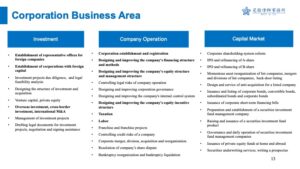
JCai: Yeah, as a law firm, we are a full-service firm. We help so many practices like in corporation, finance, shipping, IP and criminal law. But as to my team, we focus on capital market cases in corporation and finance.
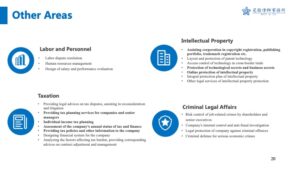
JE: Okay, so your specialization as an individual partner is more in the area of financing. Would that include financing for smaller companies, private capital, private equity, venture capital, etc.?
JCai: Yeah.
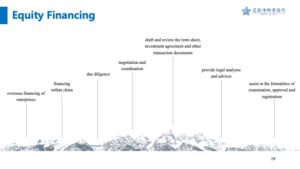
JE: Okay. Because that is obviously for our viewing audience, a very important sector. They’re not listed companies. They’re not public funds. They are raising private capital, there are unlisted companies. So that would be an area that you would particularly focus on. Okay. In your other practice areas, even if they’re not your areas of specialization, what do you think sort of two or three other important areas are with regards to smaller firms? Are there sort of more practice areas that a smaller firm would need than others other than the finance and investment that you talked about.
JCai: Okay, I can present three views. First is shipping and the maritime. Our team, my partner, they are number one in China. And he really is number one, and the company is also in criminal law. We have a partner who has the team, they focus on the police The criminal law field and they are number one in Shanghai. And, and last but maybe not the least, the intellectual property. I have a partner in RICC, friend with a long-term relationship like 15 years. So, I present, emphasize these three teams that are very professional.
JE: Okay, now, the last sector that you meant that you mentioned IP, that’s a very topical one these days. A lot of the firms that we are working with are involved with technology or healthcare and have IP or patents or maybe applications to FDA, or other regulatory bodies. So that that area is something that people in your firm cover fully
JCai: Yes and they are very professional in the protection of IP rights.
JE: Now, I remember one story and I think it was related to IP that you told me when I was in your office meeting with the partners that there’s also an IT group of people that work with you to help set up business processes and other things like that. Can you just remind me of that because I, I don’t recall the details, but it was a very interesting proposition.
JCai: Yeah, we have an IT team. They focus on the IT system and how they can help you to protect your intellectual property rights in another way. So, it’s like in practice. And we in China, we do have the internet court, so they focus on that as well.
JE: Okay, now that’s how I remember it. There’s a lot of issues, regulations related to the operation of internet sites, e-commerce. So are they they’re sort of like consultants in that they help you set up your systems to both be effective, but also compliant with the laws. Is that correct?
JCai: Yeah. Okay. All right.
JE: And what practice area do they fall under? What do they fall under a particular
practice area, like IP or criminal, or are they sort of an IT Service Group for all practice areas?
JCai: Ah, they might be a full service, but they focus on IP and criminal law.
JE: Okay. Okay. So that’s interesting, a little bit to supplement the legal side to the actual application side. Okay. So, I noticed in your presentation, which the readers will be able to see when they’re viewing this document. You have a senior management team of four people. Do you want to talk a little bit about them?
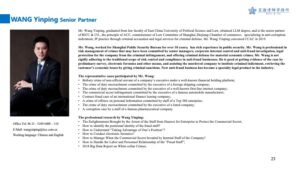
JCai: Okay. As to our senior partner team, first is Mr. Wang and he graduated from the same university with me. And he convened the CCAC in 2019. In the year before to becoming a lawyer he was a policeman. So, he has a lot of relationship with Shanghai Public Security Bureau for over 10 years. Okay, let’s move on to Mr. Yan Bing also our Senior Partner, and he powers the shipping and maritime law. And he’s a senior partner of RICC and I can give you a little story to why our law firm is named RICC & Co., okay? RICC is RenHe Insurance Consulting Company. So, he focuses on the insurance and shipping law. That’s why our law firm has this English name.
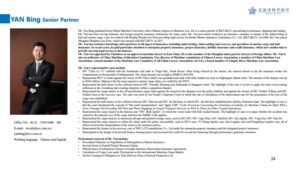
JE: Okay. So does that mean it started off related to shipping insurance related to shipping that’s, that’s sort of its original history.
JCai: Yes, and his team in the Number one in China and they started RICC back 26 years ago in Shanghai.
JE: And I guess the Shanghai area is one of the largest ports in China. A huge amount of maritime shipping. So, I guess that’s a very important part of the Shanghai economy.
JCai: Yeah. Okay. So, the last one is Huang Pulu. You have seen in our office, Mr. Huang focus on intellectual property law. He’s also very professional in healthcare consultancy.
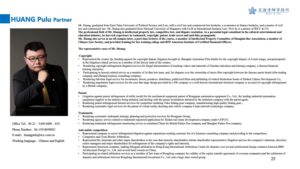
JE: Okay. Now, do you consider IP patents and trademark to be a similar practice area to the registration related to healthcare like getting FDA or other things? Are they both considered IP Or is his patents and trademarks sort of a separate business practice from the regulatory applications you face in the healthcare system?
JCai: Such a long question. My guess is that I am not very professional in IP law. Maybe next the interview. You could see the interview with Mr. Huang, though, he could tell you something more.
About the Legal Industry in China
JE: Okay, so we will, we will focus on a detailed analysis of patents versus healthcare applications as our second article. Fair enough, okay. Okay, so that covers off, I think most of the points we have in the second section, which is about RICC. And now let us turn to the third section to give the viewers a little bit, of particularly the ones outside of China, a better understanding of the legal industry and the legal system in China. Given you’ve gone to America and other countries, so you’re able to contrast China to other countries, whereas many readers won’t be, describe the sort of overview of the legal system in China. And you know, is it very different from America, Europe, or are there a lot of similarities?
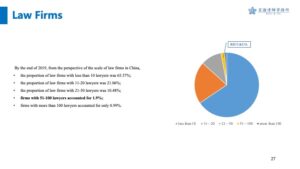 JCai: As a law firm, maybe there’s not so much difference. And if I have to give an overview of the legal industry in China, we can see the slides in Pages 27, now made a chart from the perspective or the scale or long term in China. RICC, maybe top 3%. You can see the scale covering 51 to 100 persons, it’s like how to set not intermediate, is larger law firm. Covering like more than 100 lawyers, it’s very, very few, like even covering 1% In fact, 0.99% are very large.
JCai: As a law firm, maybe there’s not so much difference. And if I have to give an overview of the legal industry in China, we can see the slides in Pages 27, now made a chart from the perspective or the scale or long term in China. RICC, maybe top 3%. You can see the scale covering 51 to 100 persons, it’s like how to set not intermediate, is larger law firm. Covering like more than 100 lawyers, it’s very, very few, like even covering 1% In fact, 0.99% are very large.
JE: Okay. I know there’s beginning to be international mergers and alliances in law firms. I think there were some mergers between American and British firms. Do Chinese law firms have mergers or sort of formal legal partnership arrangements with law firms outside of China?
JCai: We also have a merger and RICC is a merged law firm. How to say that, okay. RICC is founded 26 years ago in Shanghai, and Xinghan is founded 10 years ago in Shanghai, and the two law firms made a merger and acquisition. And after that, we got RICC now. So, the Chinese name of our law firm is Xinghan and the English name of our law firm RICC. Just a merger of two law firms. We are also doing this kind of thing China.
JE: Okay. Okay. That’s interesting to know. So now the judicial system, and I’m focusing more on commercial business law, as opposed to criminal law. How is it structured? Is it mostly at the local government level, provincial level, federal level? Where are the laws made that impact companies’ commercial law?
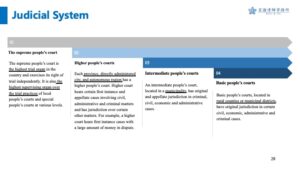
JCai: Okay, as to civil law, judicial system, if you can see the slide 28. That the system includes the four parts, basic people’s courts, intermediate people’s courts, higher people’s courts and the Supreme People’s court. So, it doesn’t include a federal or something else. Yeah. In China is only four levels of people’s courts and is different, like to the judicial system in western countries, because when you are in China, adjudicate in civil cases, people’s court shall apply system and have the two trials and a second is final. It’s different, especially with UK and US and the compared with American legal system. Chinese judges are in a more dominant position.
JE: Okay. Now you mentioned it’s a civil legal system. So, it’s relatively speaking, more similar to continental Europe like France, which has a civil legal system, as opposed to the common law system that was in the UK and in America, so it’s slightly closer to the continental European, less like the British or American style, a civil legal system. Okay.
JCai: Yeah, we have a story in China is like our civil law system just copied from Germany.
JE: From Germany. Oh, not from France. Okay. So, there’s a lot of historical ties between Germany and China I. I work with the auto industry, and I know that the ties between Germany and China in the auto industry are very strong. But I didn’t know there was a tie in the legal system. So, I’ve learned something today. Okay. What about if there is a dispute between two partners, whether it’s two domestic companies, maybe a foreign company and a domestic company, have all legal entities got the same rights, the same due process in court or is there any difference between treatment of state-owned companies versus private sector, big versus small, foreign versus domestic?
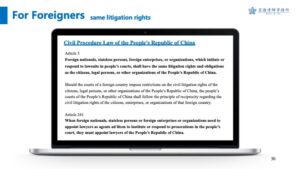
JCai: I can be brief. They have the same legal rights. So, we say the rules like same litigation rights in China. The only thing I remind you is, no matter what kind of entity you are, you have to appoint the lawyers held the bar or the People’s Republic of China. You cannot appoint an international law firm.
JE: Okay, yeah. You mentioned that before and that that makes sense. Obviously. What about for contracts? Do contracts, must contracts be in Mandarin, or if they say to foreign firms, both in China and could they have a contract in English? And is that legally enforceable if they both agree to it?
JCai: Oh, that’s okay. Yeah, we can sign contracts in other languages, not just Mandarin. Yeah, that’s okay. If you make a contract, you say it clearly then it’s legal. But you have will only have the litigation in China. So, you have to use the Civil Procedure Law in China, is different.
JE: So how would that work? If in the court if there was a contract, where both parties agreed it was the English language precedent? Are there special judges who speak foreign languages? Or does the process have to be sort of translated even though English might be the language of the contract?
JCai: Okay, my fault is like, we have a translator in People’s Court in China as, as parties, you could have a contract in English in French, or any other languages. But if you hold the litigation rights in China use us as their to the people’s cause in China, judge, he can only use Mandarin. So, we’re going to have a translator helping us.
JE: Okay. So, if there is a contract where the language is in English, in the court system, you will have a Chinese lawyer and he will be speaking to the judge and all of the other parties in Mandarin. And maybe the person in the English company will just have to be getting a translation of the conversations going on in the court. So, the whole process is still in Mandarin, even though the contract is denominated in English
JCai: Yes. But the contract itself is legal.
JE: Okay. So legal to be in English but the practical aspects of dispute resolution always go through the courts and will be held in Mandarin.
JCai: Yes, just because Mandarin is the official language in China and the People’s Court can normally only use the official language in China. The exception is contained in article 11, paragraph 2 of The Civil Procedure Law of the People’s Republic of China says, “In the areas where an ethnic minority is concentrated or a number of different ethnic nationalities live together, the people’s courts shall conduct hearings and publish legal documents in the spoken and written languages commonly used by these people.”
JE: Okay, use of a single language is normal, that’s true in most countries, although I remember in Canada with two official languages, English and French, you can actually choose which one to have it in.
JCai: Okay. However, if you do not want to sue in People’s Court you could use arbitration. And if you set arbitration in Hong Kong, then maybe the language could be English.
JE: Oh, okay interesting to know. What about just an extension and I think this also relates to slide 31. You, you’ve talked about how, as a lawyer, you cannot have outside interests,
positions and things like that. What about general ownership? Is a person, not a lawyer, allowed to have different board positions in different companies? Let me give you an example.
I know a lot of companies have local subsidiaries in different municipalities. So, let’s say my company, which is registered in the Shanghai Free Trade Zone, I’m an owner, a director of it. If I created a subsidiary say in Suzhou, could I also be the legal rep, director and board member of that? So, there’s, there’s not I’m not a lawyer. So, there’s no restriction on the number of sorts of board positions, legal reps, I can hold in companies in China. Yeah.
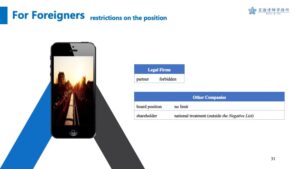
JCai: And the only thing I remind you is the negative list. Only when you are in the negative list, you have restrictions on the position. Otherwise, it’s free for you to be in board or shareholder.
JE: Okay. And that’s an either a foreign controlled company or a domestic controlled company as long as they’re not on the negative list. Okay, that’s interesting to know, because I know it’s probably more common in China for a company to have several subsidiaries, maybe in different provinces, or local jurisdictions and elsewhere where maybe one company is just for the whole country or something like that. Okay, so that’s very good. We’ve touched upon tech and IP rights. I’ll just repeat the last point and you touch upon it on slides 32 and 33. Hot topic, how would you characterize the protection of IP rights in China, both in law and in practice. Are they, are they changing a lot? Are they consistent with international standards? What sort of general comments can you make on that?
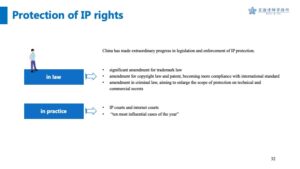
JCai: IP rights? China has made extraordinary progress in legislation and enforcement of IP protection in the last decade. In law now significant amendment, for trademark law has appeared and for copyright law, and now it’s becoming more compliant with international law. And besides, in criminal law, we are aiming to enlarge the scope or protection of technical and commercial secrets and as to e-practice, IP court and internet court has been founded now. Maybe into the 10 most influential cases. So, the here is China to see our progress in IP protection.
JE: And this is, of course, a big area of specialization for your firm. And no doubt will make a whole separate topic at some later date. But there’s been a lot of developments and what I take from what you’ve just said is they, they they’ve broken it into a couple different areas like IP protection. Internet is sort of a separate activity, the criminal law about the secrets, you may trade from a company, so IP is actually now a lot of different sections and specializations within China.
JCai: Yeah, okay.
Case Study of Equity Incentive
JE: Okay. Now, before we get to the last area, which is sort of a case study of equity incentive, and I’ll tell you in a moment why I chose that, is there anything else you’d like to add just at this point in time about your company, or the industry that that perhaps I missed or skipped over with? Okay. Now, I’ll tell you why I chose this. And I noticed in your practice areas, equity incentive was an area that your firm specialized in. Now, I remember a few years ago, I think it was 2016, where it was very popular to have startup firms. And I observed and this was in Shanghai, a lot of firms would have a principal and they’d hire often young staff. And they wouldn’t pay them. They just gave them equity incentives. Sometimes they even told the staff they hired, the staff had to invest money in the company and buy shares as a sort of a right to work, which I found rather strange, but clearly with all of the startups in China now, equity incentives, I guess, are a very important topic. So, I’m not a specialist in this area. Give us some sort of general guidance of sort of the themes to think about, whether you’re a senior manager or a young person joining a company, what sort of things do you need to think about and structure when it comes to equity incentives from employment.
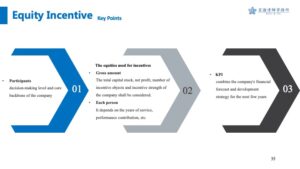
JCai: Our page 35 could give you three key points to equity incentive but before that equity incentive is the most important way to start out, and the founding partners to raise money. And like if this money partner, she only wants high salary or money, maybe she’s not the right one to be in the founding partner. Sometimes, besides legal way, we have to think about the business plan. So, you have to find the ones who are going to be with you to do the startup and innovation without money, but only equity. Okay, after this, I’m going to give you three key points. First, are the participants, is like you have to focus on the equity incentive plan, you will in decision making level and core part of the company is like most important to us in the company. You cannot send the equity to anyone in your company, we don’t think that’s good. And the second one is, the practice is used for incentives. Maybe you have considered to first is the gross amount and second is how to send it to each person. The total capital stock, net profit, number of staff or use of it affect objects and the incentives of the company shall be considered as our gross amount. And it depends on the years of service. Performance contribution of each person is a consideration. You have to think when you’re in your equity to them. And besides, always the option pool, you have to focus the option pool to the founding partners in the first time. The last thing is KPI, and how you should comply. Combine the company’s financial forecast and development strategy for the next few years. The next few years, usually three to five years.
JE: Okay. I know it’s a very complicated area. It has a big impact on, or it’s greatly affected by the seniority of the people, their authority. It has impacts on incentives. Let me ask just a couple of basic questions because I’m more concerned about the impact on more junior employees. Now, if you’re in a limited company, the first level, not a company limited by shares, but a limited company, and you’re a junior staff, and the boss says, okay, you had a good year, I’m not going to pay you cash, but I’m going to give you 5% ownership of the company. Are you legally able to sell that to anyone else, even if you can find someone to buy it?
JCai: Oh, that’s legal. There is no restriction.
JE: So, I was trying to think of, if a person at a junior level at a small percentage of shares, how could they actually monetize, get cash for that, so you’re saying that the person could sell it to anyone else. And the boss, the employer couldn’t block that sale from happening.
JCai: The boss could block that. The companies or Founding Partners could include or make a restriction. That’s why the junior person when he got stock option of equity it might be he cannot sell it to other people, they could have the restriction, but if they do not have the restriction, it is legal to sell.
JE: About the contract and the relationship for the shares. Do you need to have…Sorry, go ahead and finish.
JCai: In the contract, you could set restriction. Will you buy it will sell it The price, you’re buying it in settings, but it is also okay. When you do not set the restriction.
JE: Is there some minimum percentage 10%, 20%, whatever, you need to have as a shareholder before you have some sort of real influence in the company.
JCai: I don’t understand your question. I’m sorry.
JE: So, for example, sometimes if an investor wants to invest in a company, they want to be able
to influence decisions, and they want to demand a seat on the board of directors, for example. So, if you’re an employee, is there some percentage, let’s say you’re getting three or four percent shares every year, is there a level that you get to say 10% where you can suddenly demand of the senior management I want a seat on the board or does that give you some greater authority to do something or does it not matter what percentage you owned?
JCai: Okay, okay I guess you are asking is the percentage of the equity and the rights that they have, yes, right. Yes. Ah is kind of complicated question. Maybe I can just to give you a summary. Yeah, like when you got more than 51% of the limited the company you can control the authority of that company. Let me set an example, when you say ‘no’, then the company cannot get investor when you control 51 percentage of authority. So that means you can control and to be a minimum is like 34 percentage or company when you are higher than that you can say ‘no’, stop the company getting new investors. Okay, so, it’s different about the board positions is about the shareholder.
JE: Okay, okay. It’s not on my list, but I just remembered it. In Chinese corporations, there’s two important positions, one is called Legal Rep and one is called Supervisor. What what’s the significance of those two positions?
JCai: Supervisor is kind of like an officer, a title in illegal way. As the most negative situation, as a Supervisor, you could sue shareholders and the company. Maybe they are doing something bad to shareholders or employees or anything else. But you’re early in giving it to a Supervisor do not have any, any right compared to the shareholder rights of the Director or Board rights.
JE: No that no, that’s clear. What about the What about the other position, Legal Representative, Legal Rep.
JCai: Legal Rep is very important, because everything that has to be done you do need him to sign on the contract of the shareholding meetings, or anything else actually. So, legal representative is very important whereas Supervisor is kind of like just a job.
JE: So, if you’re a small foreign firm, and you’re setting up a company in China, you need to appoint a Legal Rep and a Supervisor. And certainly, with respect to the Legal Rep, you have to be very careful who you choose. It’s someone you trust because they do have an amount of influence. Over the company.
JCai: Yes.
JE: Okay. Okay. I learned that experience the hard way to that, that last question was of personal interest to me, Legal Rep and Supervisors. Okay. Very interesting. Okay, those are the end of the talking points we have, of course, when we when we post this on the Venture Watch site, it will have these the slides that you have referred to in between. So, the viewers will have much more detail about what you’ve been speaking about here. It’s five to three. We’re drawing up to the hour. Is there any sort of final comments or anything else you’d like to add today about businesses, legal firms, legal issues in China?
JCai: Okay, maybe only One word will help me being confusing. Or you don’t know how to do it the most reasonable way in China, if you just come to ask us for consultancy, we could give you a lawyer in China we do that. Just localization your mind.

End.








